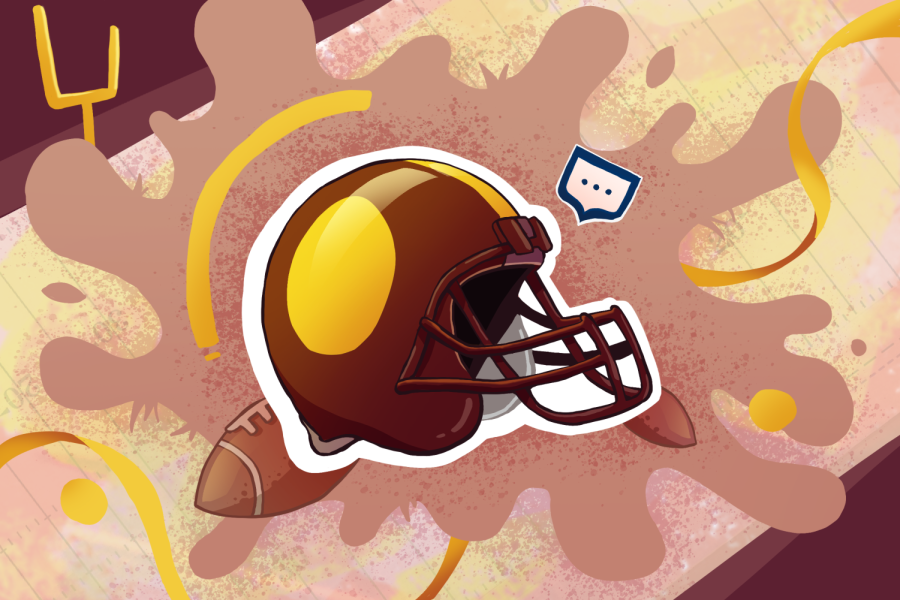Falling back in love with the sport I used to dread: My experience with club soccer
February 25, 2021
I was at the State Cup, arguably one of the most important tournaments of the year. Every one of my teammates was excited to get onto the field, but something felt wrong to me. My heart sped up and my hands began to shake as the coach called the starting lineup. A wave of relief flooded over me when I didn’t hear my name. I wondered when the sport I used to love turned into the game I feared.
I still remember the first time I played soccer. I was five years old, sitting on the patchy grass field outside Burning Tree Elementary School and eagerly waiting to kick a ball around with the other kindergarteners. Fumbling with the laces on my cleats, I gazed at the five-by-seven yard field with two small, blue goals set up at each goal line. I jogged onto the field, wind whipping through my ponytail, and felt exhilarated and free. I’ve been playing soccer for 11 years, but my first day is still one of the happiest memories I have of playing the sport.
From the day my soccer career started, I wanted to play nonstop. I loved being outside and active with my friends on my recreational-level team, but when I was nine, I decided to try out for the competitive club team that I’m still playing with today. I was tossed into a group of unfamiliar faces, in an intense environment that was all business and no messing around — nothing like what I’d been used to at the lower level.
It took some time to acclimate to the new level of play, but it didn’t change how much I loved the sport. When I was 12, though, my team got a new coach, and my outlook on soccer changed for the worse. I remember my first practice with him: someone made a small mistake, and his booming voice yelled at her from the sideline. I was taken aback; a coach had never screamed at me for messing up in practice, and I wasn’t sure how to react. I was shocked.
As the weeks went on with my new coach, his screaming got louder and more frequent. I became scared to play out of fear of losing the ball or making a pass that the other team intercepted. It was like I no longer knew how to play the game I had been practicing for years. Soccer was supposed to be an escape from the stresses in my life, but it was hard to enjoy practice when I was nervous and upset for the entire hour and a half.
I would come home from practice and tell my parents whether or not I had cried. If the coach only screamed at me once, it was a good day. They downplayed the situation, telling me that my coach wanted to make me better and that I just needed to grow a thicker skin. But I didn’t have thicker skin, and I couldn’t separate an attack on my soccer abilities from an attack on me.
As I got older, the social dynamic on the team shifted, too. My teammates started to make passive-aggressive comments to each other during practices and games; there was constant negativity. I couldn’t help but take those comments personally, and over time, it wore me down as a player and as a person. I became my biggest critic, being even harder on myself than my teammates and coach were. I lost my confidence, and it showed through my play. It was hard to be successful when I had a constant voice in my head telling me, “You’re going to mess this up.”
Playing was no longer fun as I continued to be hypercritical of myself. During the school day, I nervously awaited practice approaching at 6:30 p.m. The thought of ending practice early because of a thunderstorm became exciting instead of disappointing. I was even happy to get sick and leave school early because it meant that I didn’t have to go to practice that day. I had succumbed to my nerves and self-doubt — they were all I could think about. And it wasn’t because I didn’t want to play; it was because I didn’t want to fail.
The most vivid memory I have of this anxiety is from about a year ago. I was in the backseat of my teammate’s car on the way to practice. As we neared the field, my heart started racing, my hands began to shake and I broke out in a panicked sweat. My breathing became shallow, and I couldn’t think straight. I was having a panic attack before practice.
Fear had ruined my mindset. Instead of working hard to fix my mistakes, I turned away from every opportunity to play. I became content with sitting on the bench because I knew if I didn’t play, I couldn’t mess up. It’s heartbreaking to me to think about an athlete wanting to sit on the bench and hating to play. But that athlete was me, every game.
The most difficult aspect of my lack of confidence was how it affected me as a person, not just as a player. I doubted everything I did — my personality, the way I looked, my actions — all because I had become so focused on failing in what was a major part of my life.
I brought up my feelings to my parents multiple times, but nothing really changed. The arguments usually began with me detailing an incident from practice and ended in a screaming match where my parents simply suggested that I should quit if I couldn’t handle criticism. It was a fair point. I knew it was in my best interest to quit because the game had destroyed my mental health. I had even considered quitting several times, but I never went through with it.
At the time, I didn’t recognize that the sport wasn’t fun anymore because I had always considered it the thing I loved. It never occurred to me that could change. Even though it made me miserable, I still held out hope that soccer could make me happy like it did when I was five. I couldn’t walk away knowing that there was a possibility I could change my outlook and fall back in love with the sport.
I was right. My outlook on soccer did end up changing. When COVID-19 caused schools to send us home in March for the remainder of the year, I, like high schoolers across the world, lost every aspect of normality I had in my life. Extracurricular activities and club sports were canceled, and six months passed where I couldn’t attend a single game or practice. At the beginning, even though I was concerned about the safety of others, quarantine was a much-needed break for me. I could breathe, relax and get out of my own head. The time apart from soccer allowed me to rebuild my self-confidence and prioritize my mental health without anything else clouding my focus. And once I did that, I began to really miss soccer.
I decided to think of the sport as something different from what it had been for the last few years, as something fun. I became motivated to improve and excited to play again. My team also got a new coach — one with a completely different approach to criticism — to whom I responded better, and I actually started bettering my playing skills. When the county allowed sports to resume, I no longer felt a sense of dread. I was excited. Three years ago, I didn’t think that feeling was possible.
I still see my previous coach frequently, as he’s the director of coaching at my club. He’s at all of my team’s practices and games, but he no longer bothers me because I don’t let him. Him watching me enjoy playing is just a reminder of how far I’ve come. I now appreciate my new coach’s more constructive criticism and am motivated to get better at the sport.
I walked onto the field my first practice back with a smile on my face. My hands weren’t shaking, and my heart wasn’t racing. I was elated to play without the burden of my own negative thoughts getting in the way. I found joy in the thing that used to mean the complete opposite to me. I don’t dread going on the field anymore — I dread being taken off.







